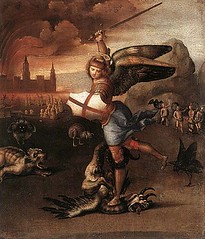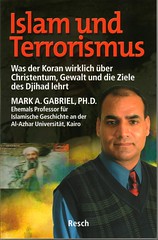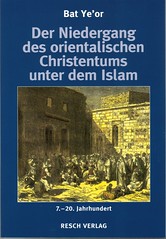On March 27, 1996, Muslim extremists kidnapped seven Trappist monks from their monastery in the Atlas Mountains near Algiers. After two months, the Groupe Islamique Arme (GIA) announced that the monks' throats had been cut. The bodies were never recovered; the severed heads were buried at the monastery in Tibhirine. There they await the restoration of the monastery, in a calmer time.
The martyr-monks of Tibhirine came to world attention when the last testament of their prior, Father Christian de Cherge, was released by his family in France. Father Christian closed his letter by addressing the murderer he expected would kill him one day: "And you also, the friend of my final moment, who would not be aware of what you were doing. Yes, for you also I wish this `thank you' — and this adieu — to commend you to the God whose face I see in yours ... may we find each other, happy `good thieves,' in Paradise, if it pleases God, the Father of us both. Amen." I remember writing at the time that this last testament would make a fine second lesson in the Office of Readings for the feast of Father Christian de Cherge and Companions, Martyrs.
John Kiser, a former international technology broker with an interest in world religions, found the story of Father Christian, his fellow Trappists, and their Algerian Muslim friends and enemies irresistible. His search for the truth about this drama, a powerful metaphor for our times, is now available in "The Monks of Tibhirine: Faith, Love, and Terror in Algeria" (St. Martin's Press). It's a fine read which does justice to the martyrs without turning them into plastic saints.
Kiser's evocation of the friendships that grew between the monks and their Muslim neighbors is particularly poignant. One of the Tibhirine Trappists was a physician, and the local villagers came to depend on him for basic health care. Other Muslims did odd jobs around the monastery, which maintained a classically Trappist, no-frills rhythm of prayer and work. It was a way of life that fit well with the poverty of the people with whom the monks lived.
The Trappists did not proselytize. Rather, they hoped that, by living Christian charity with integrity, they would demonstrate that their faith was no threat to the dominant Islamic culture of Algeria. Genuine religious freedom in the Islamic world may be an impossibility, given current Muslim self-understandings and resentments. But perhaps tolerance is a possibility. That, at any rate, is what the monks of Tibhirine tried to embody by being themselves — consecrated Catholic religious — while living respectfully among Muslim neighbors.
Kiser also does a good job of describing the kind of extremists who murdered the monks — unemployed, ill-educated young men, full of unfocused angers, easy prey for the Islamist rabble-rousing of politically ambitious (and similarly ill-educated) clerics. One wonders just how many hundreds of thousands of such young men exist throughout the Arab Islamic world. At the same time, Kiser argues that the murder of the monks, which was condemned by many Islamic leaders and seems to have been deeply resented by a majority of pious Algerians, was a turning point in that strife-torn country. I hope he's right, but I tend to doubt it; 40 people were killed in one recent month by a still-active GIA.
If there is one disconcerting thing about this otherwise ennobling book, it's John Kiser's suggestion that the Trappists and those Muslims who became their friends learned to appreciate each other on the common ground of a general religiosity, mediated through charity and fellow-feeling. It seems very unlikely. Christian de Cherge seems to have been a theologically adventurous soul. At the same time, his "testament" is thoroughly and unmistakably Christian. A man who wrote the way Father Christian did about his possible assassin was not a man affirming generic pieties; he was a man with thick, deep roots in a particular tradition, Christianity, and specifically Catholic monastic Christianity. The Muslims who became the monks' friends were similarly rooted in a specific, thick religious tradition.
All of which reminds us that genuine interreligious dialogue means taking differences seriously, not looking for some mythical "neutral" position at which differences disappear.
George Weigel is a senior fellow of the Ethics and Public Policy Center in Washington, D.C. Weigel's column is distributed by the Denver Catholic Register, the official newspaper of the Archdiocese of Denver. Phone: 303-715-3123.
Mártires de Argelia 10 años después
The martyr-monks of Tibhirine came to world attention when the last testament of their prior, Father Christian de Cherge, was released by his family in France. Father Christian closed his letter by addressing the murderer he expected would kill him one day: "And you also, the friend of my final moment, who would not be aware of what you were doing. Yes, for you also I wish this `thank you' — and this adieu — to commend you to the God whose face I see in yours ... may we find each other, happy `good thieves,' in Paradise, if it pleases God, the Father of us both. Amen." I remember writing at the time that this last testament would make a fine second lesson in the Office of Readings for the feast of Father Christian de Cherge and Companions, Martyrs.
John Kiser, a former international technology broker with an interest in world religions, found the story of Father Christian, his fellow Trappists, and their Algerian Muslim friends and enemies irresistible. His search for the truth about this drama, a powerful metaphor for our times, is now available in "The Monks of Tibhirine: Faith, Love, and Terror in Algeria" (St. Martin's Press). It's a fine read which does justice to the martyrs without turning them into plastic saints.
Kiser's evocation of the friendships that grew between the monks and their Muslim neighbors is particularly poignant. One of the Tibhirine Trappists was a physician, and the local villagers came to depend on him for basic health care. Other Muslims did odd jobs around the monastery, which maintained a classically Trappist, no-frills rhythm of prayer and work. It was a way of life that fit well with the poverty of the people with whom the monks lived.
The Trappists did not proselytize. Rather, they hoped that, by living Christian charity with integrity, they would demonstrate that their faith was no threat to the dominant Islamic culture of Algeria. Genuine religious freedom in the Islamic world may be an impossibility, given current Muslim self-understandings and resentments. But perhaps tolerance is a possibility. That, at any rate, is what the monks of Tibhirine tried to embody by being themselves — consecrated Catholic religious — while living respectfully among Muslim neighbors.
Kiser also does a good job of describing the kind of extremists who murdered the monks — unemployed, ill-educated young men, full of unfocused angers, easy prey for the Islamist rabble-rousing of politically ambitious (and similarly ill-educated) clerics. One wonders just how many hundreds of thousands of such young men exist throughout the Arab Islamic world. At the same time, Kiser argues that the murder of the monks, which was condemned by many Islamic leaders and seems to have been deeply resented by a majority of pious Algerians, was a turning point in that strife-torn country. I hope he's right, but I tend to doubt it; 40 people were killed in one recent month by a still-active GIA.
If there is one disconcerting thing about this otherwise ennobling book, it's John Kiser's suggestion that the Trappists and those Muslims who became their friends learned to appreciate each other on the common ground of a general religiosity, mediated through charity and fellow-feeling. It seems very unlikely. Christian de Cherge seems to have been a theologically adventurous soul. At the same time, his "testament" is thoroughly and unmistakably Christian. A man who wrote the way Father Christian did about his possible assassin was not a man affirming generic pieties; he was a man with thick, deep roots in a particular tradition, Christianity, and specifically Catholic monastic Christianity. The Muslims who became the monks' friends were similarly rooted in a specific, thick religious tradition.
All of which reminds us that genuine interreligious dialogue means taking differences seriously, not looking for some mythical "neutral" position at which differences disappear.
George Weigel is a senior fellow of the Ethics and Public Policy Center in Washington, D.C. Weigel's column is distributed by the Denver Catholic Register, the official newspaper of the Archdiocese of Denver. Phone: 303-715-3123.
Mártires de Argelia 10 años después




1 comment:
Just saw the movie, Of God and Men, very powerful. The movie did not show the beheadings of the monks which was wise just as we should never show the image of Osama bin Laden in death.
There must be peace spread as aggressively as the hatred of extremists groups by the peaceful method of prayer, mindfulness, and realizing we are all brothers and sisters and should only care for one another. There is no way to peace through war. War leads to hate.
See the movie if you can. It is hard to move afterward. The killing of the monks is an affront to every persons humanity.
Post a Comment